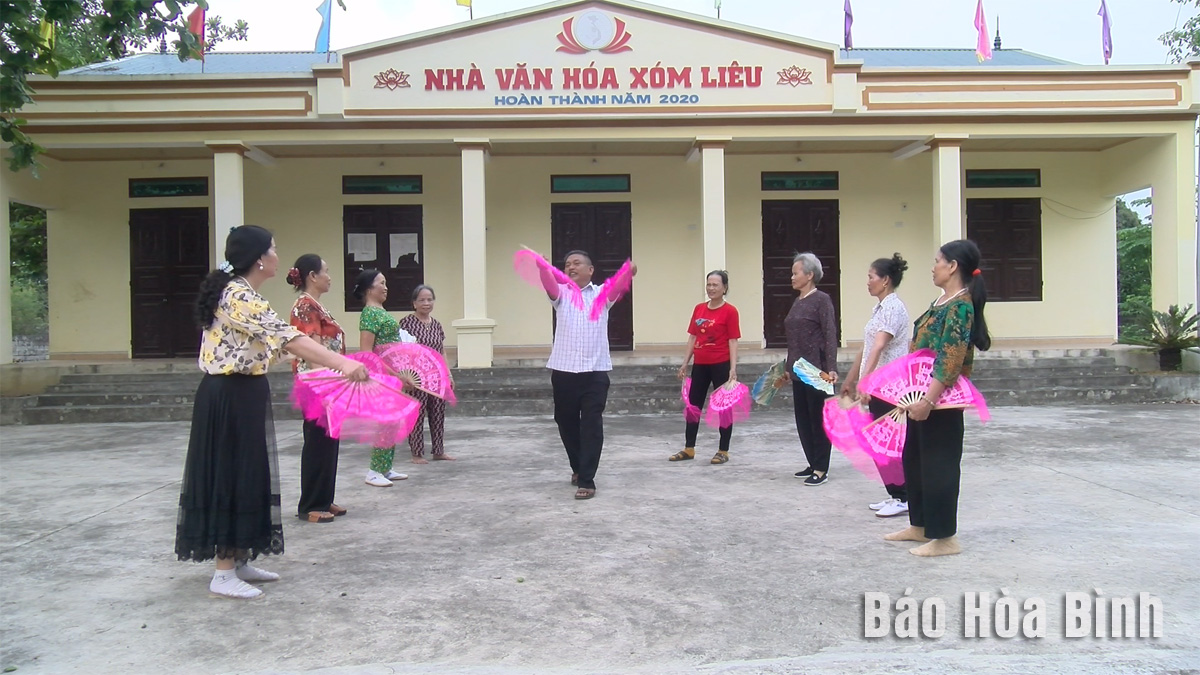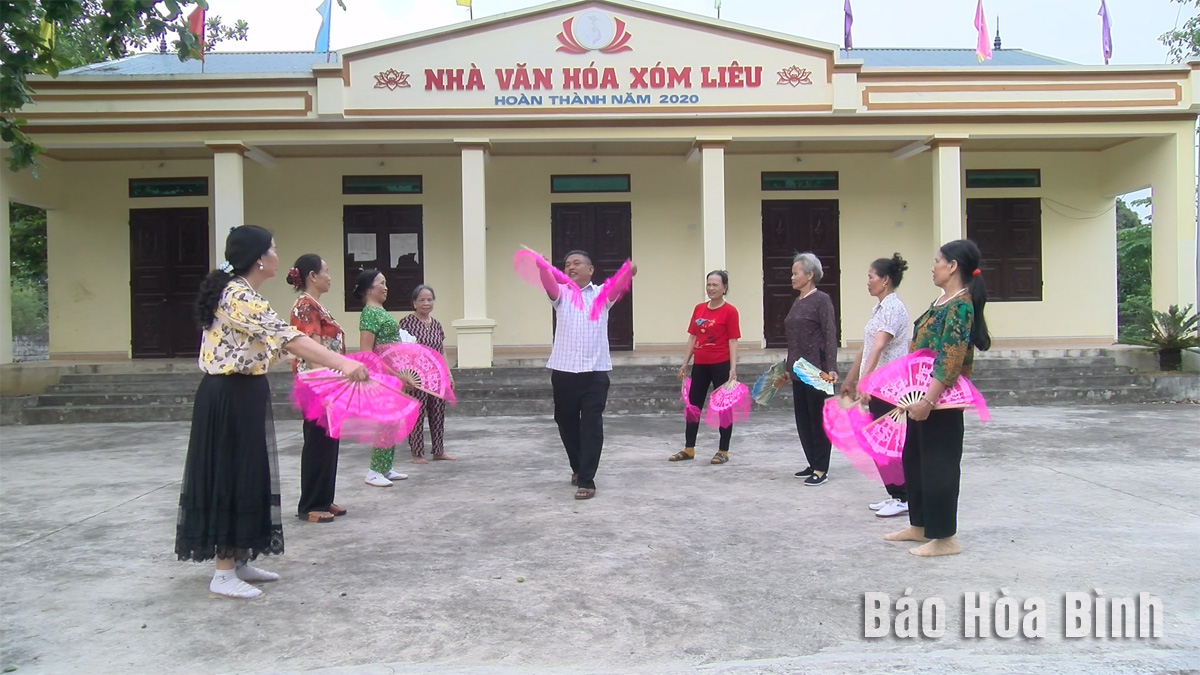
Born and raised in Lieu hamlet, Ngoc Luong commune, Yen Thuy district - a village rich in cultural tradition, from an early age Mr. Quach Cong Son was immersed in Cheo singing melodies. Therefore, although life is still difficult and difficult, Mr. Son is aware of the need to preserve the unique cultural values of his homeland. The passion for folk melodies continues to grow in his soul.
Mr. Quach Cong Son is guiding the members of Ngoc Luong Cheo singing club (Yen Thuy) to practice.
Introduced to the area in the 70s of the last century, Cheo singing has become an indispensable spiritual dish of the people in Yen Thuy district. To preserve and develop the art of Cheo in the locality, Mr. Son sought out the elders in the village and commune to restore.
and establish the "Ngoc Luong Cheo Club”, whose members are not only the people in the commune, but they are also in the other communes in the district inside and outside the province. He recorded each ancient Cheo singing for the club members to practice. In addition, he actively composed, arranged, and directed Cheo plays to participate in competitions, festivals at the levels of the district and province.
Mr. Quach Cong Son, the Chairman of Ngoc Luong Cheo Club says: "I am often invited by the government to be a director for Cheo performances to participate in competitions and fesstivals the levels of the district and province. Every time we participate there are also prizes. Ngoc Luong Cheo Club was also able to perform at the Central Government. This shows that the quality of the club's activities is increasingly improving, winning the love of the audience.”
The early days of establishing the club met many difficulties. Mr. Son had to travel everywhere in the commune, the district, and even outside the province to mobilize members to join the club. At that time, there weren't many people who knew how to sing Cheo, and there were even fewer people who knew how to play traditional musical instruments. After gathering a full team and being able to practice Cheo singing, the club encountered the difficulties due to not having a place to practice. Mr. Son discussed with his family to build and renovate his house into a cultural space, it was not only a place for the club to practice but it was also a place where folk music exchanges organized by Cheo club regularly took place.
Meeting Mr. Dang Duy Thien from Yen Tri commune (Yen Thuy), a member of Ngoc Luong Cheo club says: "With the passion for Cheo singing combined with the enthusiasm of the club leader, Mr. Quach Cong Son, convinced and motivated us to join the club. We have been participating in the club for nearly 5 years. We hope that Mr. Son will continue to develop his love for Cheo singing even more and develop Ngoc Luong Cheo Club to develop.”
More than 20 years of working in the job of "having meals at home, carrying social work” is a long time for Mr. Son to devote all his heart to the art of Cheo. Therefore, the reputation of Ngoc Luong Cheo Club is not limited to the district, in the province, but it has also been performing at the Central level. Thanks to long-term maintenance and the enthusiasm of the club members as well as Mr. Son personally, the singing of Cheo club is increasingly flying higher and farther.
Everything Mr. Quach Cong Son does to preserve Cheo singing is voluntary. He has the right to be proud of being the person who has contributed to preserving and developing the art of Cheo in Yen Thuy district. Currently, his greatest wish is that all levels and branches pay attention and support to continue maintaining Ngoc Luong Cheo Club, developing the art of Cheo, so that Cheo singing live forever in the hearts of the people.
With an increasingly vibrant and widespread emulation movement aimed at building cultured residential areas and cultured families, Yen Thuy District has been making steady progress toward improving both the material and spiritual well-being of its people, while fostering a civilized, prosperous, beautiful, and progressive community.
Once lacking recreational spaces and community facilities, Residential Group 2 in Quynh Lam Ward (Hoa Binh City) has recently received attention for the construction of a new, spacious, and fully equipped cultural house. The project followed the model of state support combined with public contributions in both labor and funding.
The "All people unite to build cultural life" movement, which has been effectively integrated with Kim Boi district’s socio-economic development goals, is fostering a lively spirit of emulation across local residential areas, hamlets, villages, public agencies, and enterprises. In addition, through the initiative, traditional cultural values are being preserved and promoted, while community solidarity and mutual support in poverty reduction and economic development are being strengthened.
A working delegation of the Hoa Binh provincial People’s Committee led by its Permanent Vice Chairman Nguyen Van Toan on June 11 inspected the progress of a project to build the Mo Muong Cultural Heritage Conservation Space linked to tourism services in Hop Phong commune, Cao Phong district.
Born and growing in the heroic land of Muong Dong, Dinh Thi Kieu Dung, a resident in Bo town of Kim Boi district, in her childhood was nurtured by the sweet lullabies of her grandmother and mother. These melodies deeply imprinted on her soul, becoming an inseparable part of her love for her ethnic group's culture. For over 20 years, this love for her hometown has driven Dung to research, collect, and pass down the cultural values of the Muong people to future generations.
In the final days of May, the Ethnic Art Troupe of Hoa Binh Province organized performances to serve the people in remote, mountainous, and particularly disadvantaged areas within the province. These were not just ordinary artistic shows, but they were the meaningful journeys aimed at spreading cultural values, enhancing the spiritual life of the people and contributing to the preservation of ethnic minority cultural identities.



